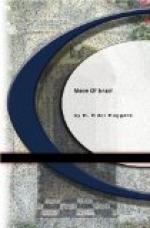“The question is wide, Ki, or so it seems to me who, as you say, have little wisdom, and whoever can answer it holds the key of knowledge. Your magic is but a small thing which seems great because so few can handle it. What miracle is it that makes the flower to grow, the child to be born, the Nile to rise, and the sun and stars to shine in heaven? What causes man to be half a beast and half a god and to grow downward to the beast or upward to the god—or both? What is faith and what is unbelief? Who made these things, through them to declare the purposes of life, of death, and of eternity? You shake your head, you do not know; how then can I know who, as you point out, am but foolish? Go get your answer from the lady Merapi’s self, only mayhap you will find your questions countered.”
“I’ll take my chance. Thanks to Merapi’s lord! A boon, O Prince, since you will not suffer that other name which comes easiest to the lips of one to whom the Present and the Future are sometimes much alike.”
Seti looked at him keenly, and for the first time with a tinge of fear in his eyes.
“Leave the Future to itself, Ki,” he exclaimed. “Whatever may be the mind of Egypt, just now I hold the Present enough for me,” and he glanced first at the chair in which Merapi had been seated and then at the cloth upon which his son had lain.
“I take back my words. The Prince is wiser than I thought. Magicians know the future because at times it rushes down upon them and they must. It is that which makes them lonely, since what they know they cannot say. But only fools will seek it.”
“Yet now and again they lift a corner of the veil, Ki. Thus I remember certain sayings of your own as to one who would find a great treasure in the land of Goshen and thereafter suffer some temporal loss, and—I forget the rest. Man, cease smiling at me with your face and piercing me through with your sword-like eyes. You can command all things, what boon then do you seek from me?”
“To lodge here a little while, Prince, in the company of Ana and Bakenkhonsu. Hearken, I am no more Kherheb. I have quarrelled with Pharaoh, perhaps because a little breath from that great wind of the future blows through my soul; perhaps because he does not reward me according to my merits—what does it matter which? At least I have come to be of one mind with you, O Prince, and think that Pharaoh would do well to let the Hebrews go, and therefore no longer will I attempt to match my magic against theirs. But he refuses, so we have parted.”
“Why does he refuse, Ki?”
“Perhaps it is written that he must refuse. Or perhaps because, thinking himself the greatest of all kings instead of but a plaything of the gods, pride locks the doors of his heart that in a day to come the tempest of the Future, whereof I have spoken, may wreck the house which holds it. I do not know why he refuses, but her Highness Userti is much with him.”




